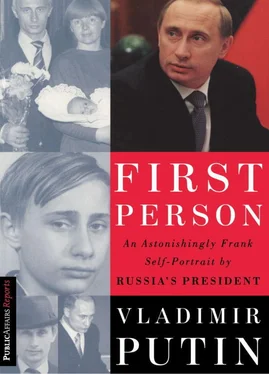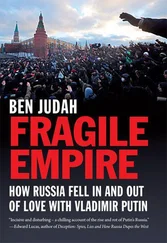Vladimir Putin - First Person
Здесь есть возможность читать онлайн «Vladimir Putin - First Person» весь текст электронной книги совершенно бесплатно (целиком полную версию без сокращений). В некоторых случаях можно слушать аудио, скачать через торрент в формате fb2 и присутствует краткое содержание. Город: New York, Год выпуска: 2000, ISBN: 2000, Издательство: PublicAffairs, Жанр: Биографии и Мемуары, Политика, Политика, Публицистика, на английском языке. Описание произведения, (предисловие) а так же отзывы посетителей доступны на портале библиотеки ЛибКат.
- Название:First Person
- Автор:
- Издательство:PublicAffairs
- Жанр:
- Год:2000
- Город:New York
- ISBN:978-0-786-72327-0
- Рейтинг книги:3 / 5. Голосов: 1
-
Избранное:Добавить в избранное
- Отзывы:
-
Ваша оценка:
- 60
- 1
- 2
- 3
- 4
- 5
First Person: краткое содержание, описание и аннотация
Предлагаем к чтению аннотацию, описание, краткое содержание или предисловие (зависит от того, что написал сам автор книги «First Person»). Если вы не нашли необходимую информацию о книге — напишите в комментариях, мы постараемся отыскать её.
First Person — читать онлайн бесплатно полную книгу (весь текст) целиком
Ниже представлен текст книги, разбитый по страницам. Система сохранения места последней прочитанной страницы, позволяет с удобством читать онлайн бесплатно книгу «First Person», без необходимости каждый раз заново искать на чём Вы остановились. Поставьте закладку, и сможете в любой момент перейти на страницу, на которой закончили чтение.
Интервал:
Закладка:
If we hadn’t gotten on board when we did, we would have been left standing on the dock. And we didn’t have a single kopeck left. I don’t know what we would have done.
So we settled into some lifeboats, which hung out over the water. And that was how we got home, as if we were lying in hammocks. For two nights I looked up at the sky, and I couldn’t take my eyes away. The ship sailed on, and the stars seemed to just hang there. Do you know what I mean? Sailors may be used to that, but for me it was a wondrous discovery.
That first evening we ogled the cabin passengers. It made us a little wistful to see how wonderful their lives were. All we had were the lifeboats, the stars, and the tins of tushonka.
Our thrifty friend didn’t have any canned meat. He couldn’t hold out any longer, and went to the restaurant. But the prices there were so high that he quickly came back and said indifferently, “Well, I suppose I wouldn’t mind scarfing down a little tushonka.” But my other friend, who kept strictly to the rules, said, “You know, you should worry about your stomach. It’s not good for you.” So the thrifty guy starved for a day after that. It was cruel, of course, but it was also fair.
When I went to university, I started concentrating on my studies. Athletics took second place. But I did work out regularly and took part in all the All-Union competitions, although it was just by habit, really.
In 1976, I became the city-wide champion. The people in our section included not only amateurs, like me, but also professionals and European and Olympic champions in both sambo and judo.
I became a sambo master black belt after entering university, and then a judo master two years later. I don’t know how it is nowadays, but back then you had to collect a certain number of victories over opponents of a certain level, and to place in serious competitions. For example, you had to be among the top three in the city or get first place in the All-Union competition for Trud.
I remember a couple matches vividly. After one of them I couldn’t even breathe, only croak. My opponent was a strong guy, and I had used up so much energy that I just wheezed instead of inhaling and exhaling. I won, but only by a slim margin.
And then there was the time I lost to the world champion, Volodya Kullenin. Later he began to drink heavily and was murdered on the street. But in university he was a fine athlete, really brilliant and talented. He hadn’t started drinking when I fought him. We were competing for the city championship. He was already world champion. Right away, during the first minutes, I threw him across my back—and did it gracefully, with ease. In principle, the match should have ended right then, but since Kullenin was world champion, it wouldn’t have been right to stop the fight. So they gave me some points and we continued. Of course Kullenin was stronger than me, but I fought hard. Under the rules of this martial art, any sort of crying out is considered a signal of defeat. When Kullenin twisted my elbow backward, the judge seemed to hear me make some grunts. So Kullenin was declared the victor. I remember that match to this day. And I was not ashamed to lose to a world champion.
There was another match I’ll remember for the rest of my life, although it wasn’t one I took part in. I had a friend in university whom I had talked into joining the gym. First he took judo, and he did quite well. Once there was a competition and he was fighting. He took a jump forward and landed headfirst on the mat. His vertebrae were dislocated and he was paralyzed. He died 10 days later in the hospital. He was a good guy. And to this day I regret talking him into taking judo….
Traumas like this were quite frequent during the competitions and matches. People would break their arms or legs. Matches were a form of torture. And training was hard, too. We used to go to an athletic center outside of Leningrad on Khippiyarvi Lake. It’s a fairly large lake, about 17 kilometers wide. Every morning when we got up, we ran around the lake first thing. After our run, there would be exercise, then training, breakfast, more workouts, lunch, rest after lunch, and then workouts again.
We used to travel around the country a lot. Once we went to a match in Moldavia, in preparation for the Spartakiad competition of the peoples of the USSR. It was horribly hot. I was coming out of our workout with my friend Vasya, and wine was for sale everywhere. He said to me, “Let’s toss back a bottle of wine each.” “It’s too hot out,” I replied. “Then let’s just relax,” he said. “Alright, alright. Let’s get some wine,” I said.
We each took a bottle, went back to our room, and flopped down on our beds. He opened his bottle. “It’s too hot,” I said. “I’m not going to.” “Really?” he said. “Okay, have it your way.” He gulped the bottle straight down. Then he looked at me. “Are you sure you aren’t going to have any?” “I’m sure,” I said. So he took the second bottle and knocked it back. He put the empty bottles on the table, and instantly he was out like a light. There he was, suddenly snoring. I really regretted not drinking along with him! I squirmed and squirmed. I couldn’t hold out any longer, and poked him. “Hey, you. You’re snoring, stop it! You’re snoring like an elephant.”
That was pretty much the exception. We didn’t party much, because drinking made the workouts that much harder. There was this one huge guy that worked out with us. His name was Kolya. Not only was he gigantic, but he had this incredible face. He had a massive jaw that jutted forward and a huge overhanging brow. One night some hooligans started picking on him in a dark alley, and he said, “Guys, calm down. Pipe down for just a second.” Then he took out a match, struck it, and held it up to his face. “Just look at me,” he said. And that was the end of that incident.
Sergei Roldugin(soloist in the Mariinsky Theater Symphony Orchestra, a family friend of the Putins, and godfather of Putin’s older daughter, Masha):
Volodya went to school with my brother. When I moved to Leningrad, my brother told me about Vovka. He brought him over to our house, and we hit it off. I think it was in 1977. After that, he became like a brother to me. When I had nowhere to go, I would go over to his house. I would eat and sleep there.
I was drafted into the army and served in Leningrad. Once, Vovka came over to see me in his Zaporozhets. I jumped over the fence and went AWOL. We went cruising around Leningrad all night. The muffler was broken, and we raced around, singing songs. I can even remember the song we sang:
“We had just one night,
Someone’s train left this morning,
And then someone’s plane a little later…”
We sang and sang, very loudly, without any inhibitions. After all, the muffler was broken.
Once my mother was given a state lottery ticket instead of change at a cafeteria, and she won a Zaporozhets car. I was in the third year of university and we couldn’t decide what to do with that car for a long time, since we were living very modestly. I had just bought my first coat when I came back from working construction, a year after the vacation with my friends in Gagry. This was my first decent coat. Money was tight in our family, and to give the car to me was absolute madness. We could have sold it, after all, and gotten at least 3,500 rubles for it. That would have settled our family budget well in advance. But my parents decided to spoil me. They gave me the Zaporozhets. I lived the good life in that car. I used to drive it everywhere, even to my matches.
I was a pretty wild driver, but I was terrified of crashing the car. How would I ever repair it?
Once you did get into an accident, though. You ran over a man.
Читать дальшеИнтервал:
Закладка:
Похожие книги на «First Person»
Представляем Вашему вниманию похожие книги на «First Person» списком для выбора. Мы отобрали схожую по названию и смыслу литературу в надежде предоставить читателям больше вариантов отыскать новые, интересные, ещё непрочитанные произведения.
Обсуждение, отзывы о книге «First Person» и просто собственные мнения читателей. Оставьте ваши комментарии, напишите, что Вы думаете о произведении, его смысле или главных героях. Укажите что конкретно понравилось, а что нет, и почему Вы так считаете.












